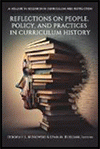
Reflections on People, Policy, and Practices in Curriculum History
Edited by:
Deborah L. Morowski, Augusta University
Lynn M. Burlbaw, Texas A&M University
A volume in the series: Research in Curriculum and Instruction. Editor(s): Cheryl J. Craig, Texas A&M.
Published 2024
America’s schools are constantly in the news today for safety concerns, contested curricula, teacher quality, test scores, and a variety of other topics. Although most people spend at least 12 years in school systems, they know little of the history or evolution of American schooling. The collection of papers assembled in this book are divided into three categories which greatly impacted American schooling: people, policy, and practices. This work seeks to shed light on what has occurred in curriculum history in the past so as to help readers develop a deeper understanding of how our system of schooling arrived at its current state.
The first section of the book examines the stories of people who had an influence on schooling and education. The second section focuses on the curricula and programs that were utilized in schools and districts throughout the country. The final chapter of the book looks at decisions that had long-ranging impact on educational policies.
The chapters of this book offer a glimpse into the history of American schooling and those people, policies, and practices that influenced its development. It is the editors’ hope that the work will spark interest in scholars and students of educational history to examine other past, as well as present, stories of educators to expand our understanding of the saga that is the American schooling experience.
CONTENTS
Introduction. SECTION I: PEOPLE. Mary C. C. Bradford’s Contribution to the Colorado Curriculum, Heather K. Caldwell. The Impact of Informal Curriculum Experiences: A Study of the Education of a Female Community Leader in Houston, Texas, Linda J. Black. The Contributions and Influence of F. James Rutherford on American Science Education: 1960–2022, Catherine Lange. Ruth Harris: Does Higher Education Practice What They Teach? Vanessa Garry and Matthew D. Davis. True Believer: The Progressivism of Willard Goslin, Whitney G. Blankenship. From Greek/Latin to Chinese: What We can Learn From the First Chinese Teacher at Harvard University, Ye Tian. SECTION II: PRACTICES. Forty Years of Service-Learning in the United States, 1969–2009, Thomas A. Kessinger. The Army Specialized Training Program and “Fast Track” Professional Preparation, Jared R. Stallones. Curricula for The Country: Farmers’ Institutes in Indiana, 1890–1910, Glenn P. Lauzon. Towards a History of Medical Higher Education in the American South: Southern Nationalism, Racial Ethos, and the Flexner Report of 1910, Tiffany Greer, R. Eric Platt, and Shamekia Woods. Curriculum and the 1970s Culture Wars Man: A Course of Study, Carolyn A. Weber, Julie Marie Frye, Connie Ables-Rigsbee, and Jesse Goodman. The Curriculum and Courses of Study at Connecticut Agricultural College, Simon N. Jorgenson. Curricular Reforms and Progressive Rhetoric: Examining the Programme of Study in interwar Ontario, Canada, Theodore M. Christou and Jackson Pind. County Teachers’ Institutes: A Snapshot From Gonzales, Texas, Deborah L. Morowski and Mindy Spearman. Content and Pedagogical Knowledge in Colorado Teachers’ Mathematics Exams at the Turn of the 20th Century, Robert M. Capraro, Lynn M. Burlbaw, and Linda Reichwein Zientek. Forty Years of Teacher Certification: The De Facto Social Studies Curriculum: Colorado County Tests, 1880–1920, Lynn M. Burlbaw. SECTION III: POLICY. Contested Curriculum and Pedagogy: California During the Rafferty Era, Mark Groen. Nature Study and the New Geography: Pre-Incarnations of Place-Based Educational Theory and Practice—1890–1920, Charles Elfer. Chartered Waters: The Twisted Navigation of the American Charter School Movement, James E. Schul and James W. Reineke. Are We Men or Are We Mice: Grades, Guns, and the Formation of Gender at Riverside Junior College, 1929–1941, Margaret A. Nash. Schism in the Schoolhouse: The Tenuous Relationship Between Social Scientists and Educationists Within the AHA Commission on the Social Studies (1929–1934), James E. Schul. About the Authors.
-
Paperback979-8-88730-544-8
Web price: $45.04 (Reg. 52.99)
-
Hardcover979-8-88730-545-5
Web price: $80.74 (Reg. 94.99)
- eBook979-8-88730-546-2

- EDU007000 - EDUCATION: Curricula
- EDU034000 - EDUCATION: EDUCATIONAL POLICY & REFORM: General
- EDU044000 - EDUCATION: Classroom Management
-
 Educating About Social Issues in the 20th and 21st Centuries - Vol 4
Critical Pedagogues and Their Pedagogical Theories
Educating About Social Issues in the 20th and 21st Centuries - Vol 4
Critical Pedagogues and Their Pedagogical Theories
-
 Educating About Social Issues in the 20th and 21st Centuries Vol. 2
A Critical Annotated Bibliography
Educating About Social Issues in the 20th and 21st Centuries Vol. 2
A Critical Annotated Bibliography
-
 Educating About Social Issues in the 20th and 21st Centuries Vol. 3
A Critical Annotated Bibliography
Educating About Social Issues in the 20th and 21st Centuries Vol. 3
A Critical Annotated Bibliography
-
 Exemplary Elementary Social Studies
Case Studies in Practice
Exemplary Elementary Social Studies
Case Studies in Practice
-
 Facing Challenges and Complexities in Retention of Novice Teachers
Facing Challenges and Complexities in Retention of Novice Teachers
-
 Schooling for Tomorrow's America
Schooling for Tomorrow's America
-
 Truth and Knowledge in Curriculum Making
Truth and Knowledge in Curriculum Making

